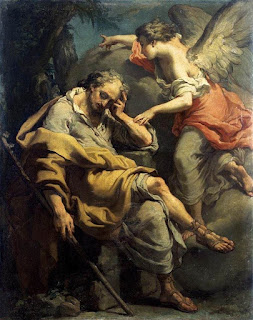Léctio sancti Evangélii secúndum Matthǽum
Matt 2:19-23In illo témpore: Defúncto Heróde, ecce Angelus Dómini appáruit in somnis Joseph in Ægýpto, dicens: Surge, et áccipe púerum et matrem ejus, et vade in terram Israël. Et réliqua.
Homily by St. Jerome, Priest at Bethlehem.
Bk. i., Comm. on Matth. ii.
From the words, they are dead, (in the Plural), which are used in this passage of the Gospel, we may understand that there were others beside Herod which sought the young Child's life probably the Priests and Scribes. And he Joseph arose, and took the young Child and His Mother. It is not written, He took his wife and child, but he took the young Child and His Mother; whence it is clear that the holy Evangelist willeth to imply that Joseph was not the father, but the Guardian of Jesus, not the husband, but the Betrothed of Mary.
Bk. i., Comm. on Matth. ii.
From the words, they are dead, (in the Plural), which are used in this passage of the Gospel, we may understand that there were others beside Herod which sought the young Child's life probably the Priests and Scribes. And he Joseph arose, and took the young Child and His Mother. It is not written, He took his wife and child, but he took the young Child and His Mother; whence it is clear that the holy Evangelist willeth to imply that Joseph was not the father, but the Guardian of Jesus, not the husband, but the Betrothed of Mary.
But when he heard that Archelaus did reign in Judea, in the room of his father Herod, he was afraid to go thither. There are some persons so grossly ignorant of history that they confuse themselves over the two Herods, as if the one mentioned here were the same who afterwards set our Lord at nought during His Passion, and they cannot understand how he should now be said to be dead. The Herod who was made friends with Pilate over Christ's death, was the son of the Herod who massacred the infants of Bethlehem, and the brother of Archelaus.
He shall be called a Nazarene. The Evangelist, in quoting these words, saith that they were spoken by the Prophets, (Plural). If he had been citing any one precise passage he would have said by the Prophet, in the Singular. But he is citing the sense of the Prophets, and not any individual passage in any of their writings. He seemeth to refer to the fact that in Hebrew the word Nazarene signifieth holy, and that Christ is the Holy One of God is the common declaration of all the Scriptures.












No comments:
Post a Comment